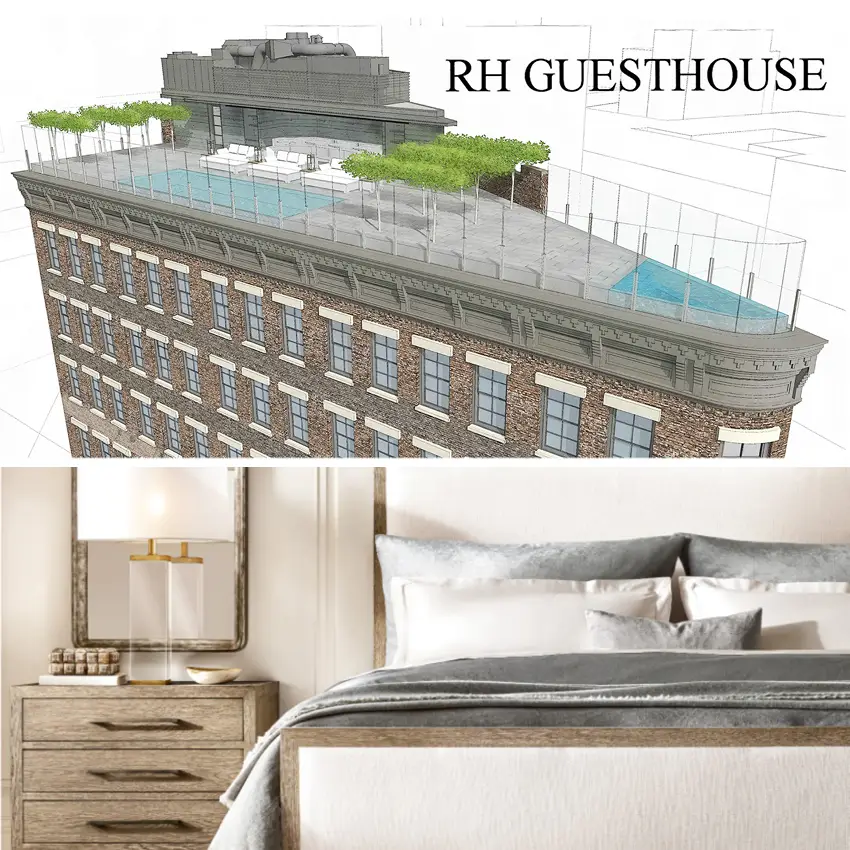Remember when Restoration Hardware was the quirky DIY-fixer’s catalog for people restoring Victorian houses? It’s come a long way from its home-spun roots back in 1979 when Stephen Gordon founded it.
Progressive CEO
In his most recent shareholders letter, Gary Friedman, the company’s current chairman and CEO, updates RH’s progress since joining the company in 2011: “The first two decades saw us evolve from a nearly bankrupt business with a $20 million market cap and a box of Oxydol laundry detergent on the cover of its catalog, to the leading luxury home brand in the world with a market value approaching $10 billion.”
There are so many trends creating this new world, with people spending more time in their homes because of Covid and the flight from the cities. People are rethinking what their homes mean. RH is well-positioned to talk to those people with the means to actually rethink those things.”
In that letter, he outlines a vision for the company no less lofty than that of Amazon’s Jeff Bezos in 1994. He describes the four pillars of the RH company:
- Products: Interiors, Modern, Contemporary, Color, Beach House, Ski House, Baby & Child, Teen and Waterworks;
- Places: Galleries, Guesthouses, Restaurants and Residences;
- Services: Interior Design, Architecture and Landscape Architecture; and
- Spaces: Plane and Yacht Design and Charter.
It’s a grand – some would say grandiose – plan to transform a furniture company into more than a lifestyle brand and into a “World of RH ecosystem” that is “immersive and multi-dimensional.” More on that from Robin Lewis and Warren Shoulberg in The Robin Report.
His vision has been met by a fair number of skeptics, especially because Friedman compares RH to Hermès and the idea of being able to “scale taste.”
RH Ecosystem Takes Root
But now he is making good on his promises, first with the opening of the premiere RH Guesthouse (a.k.a. hotel) in New York City. And most recently in Aspen, CO, where RH is investing $105 million to develop the first RH ecosystem combining an RH Gallery, Guesthouse, Bath House and Spa and restaurants with the first-time, full-furnished RH Residences.
“RH is moving further along in terms of being not just a place where people buy things that are in style, to being a place that defines style,” says Ken Nisch, chairman of Southfield, MI-based JGA, an architectural and design firm specializing in retail spaces. “It’s the idea that they are defining how people live, not just selling things for people to live. People are looking at them as a source of direction, not just a source of supply.”
Rather than take issue with the comparison of RH to Hermès, Nisch feels it’s appropriate. “They are positioned as part of a very different club, from a furniture retailer into one of fashion, the arts, design and the visual language of style. RH is continuing to transcend beyond the best in the furniture category to defining themselves alongside a different set of brands and in a different category entirely.”
Breaking Down Barriers to Unleash Remarkable Growth
Friedman refuses to be distracted by the naysayers and those that want to keep RH in a predefined box. He calls that noise. “Leaders are taking people somewhere they’ve never been, doing things they’ve never done. They’re building things and they’re building value and that’s the culture of our company,” he said in the third-quarter earnings call.
“If you walked in our Center of Innovation, you’d walk through a portal that says ‘RH, the home of the extraordinary, the remarkable and the amazing,’ because that’s how we think. That’s the focus you have to have to build one of the most admired brands in the world. And that’s our DNA; that’s our focus. So, all the other stuff is kind of noise and distractions”
Friedman is taking RH to a new place where few brands, most especially furniture retailers, have never imagined. “There were only about 30 public companies every 10 years that reached a billion dollars in revenue and grew earnings at an average of 20 percent per year for the next 10 years,” he wrote in the earnings letter, referring to research by Henry Ellenbogen of Durable Capital Partners.
Ellenbogen called these rarified few companies “The Compounders” that go against conventional wisdom within their categories. “His [Ellenbogen’s} research identified that the compounders rarely moved with the herd, unless they were leading it, and in most cases charted their own unique course,” Friedman wrote.
While many retailers are retreating to digital spaces and online engagement, Friedman is embracing the real world where people actually live.
More Than a Store
“We believe post-pandemic the need for physical and social interaction will be greater than ever,” Friedman exclaimed. “We look forward to experiencing new restaurants and resorts, plazas and parks, markets and malls, stadiums, and yes, stores.”
He goes on to further separate the idea of store from what RH is building. “We create inspiring spaces that blur the lines between residential and retail, indoors and outdoors. Spaces that are more home than stores.”
JGA’s Nisch observes that RH is not evolving from an old-world concept but defining a new world that people will inhabit now and in the future. “There are so many trends creating this new world, with people spending more time in their homes because of Covid and the flight from the cities. People are rethinking what their homes mean. RH is well-positioned to talk to those people with the means to actually rethink those things.”
In Aspen, for example, RH will be providing a context for activity and engagement that only a select few can participate in fully. Those who can experience that life fully will be those who can afford the pre-furnished RH Residences that come with exclusive membership to the RH Bath House and Spa, plus priority reservations at the brand’s restaurants and private dining opportunities.
But many can experience that life on a part-time basis through the RH Guesthouses and visiting an RH Gallery. It builds aspiration for the RH brand in much the same way that Hermès, Louis Vuitton and Chanel do in their stores, offering more affordable products, perfumes and cosmetics.
So, Friedman’s comparison of RH to Hermès isn’t as crazy as it first sounds. “From a taste, quality and authority perspective, they [Hermès] are in a class of their own. From a value perspective, we believe we can do better,” he wrote.
And if Friedman can manifest his ecosystem vision for the brand, RH can be even more meaningful than these luxury fashion brands can. Fashion is something you put on and change day-to-day. RH is creating products, spaces, services and places you actually live in and experience. The goal is to “elevate the RH brand as a global thought leader, taste and place maker,” Friedman said.
Nisch believes Friedman will know when he reaches it once the media doesn’t need to append Restoration Hardware after the RH name. “Part of RH’s battle is not with the consumer, but the trade and press. The measure is going to be when they drop the brackets behind the RH name,” he quips.





